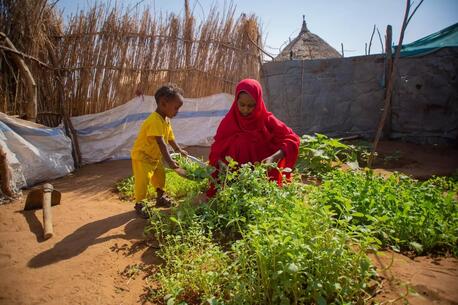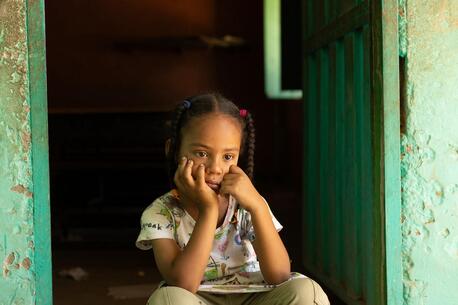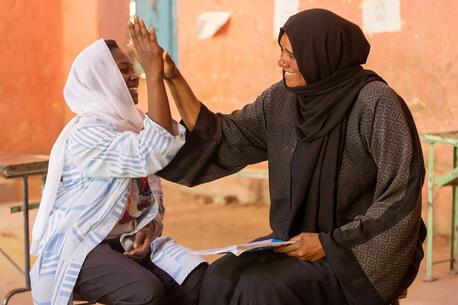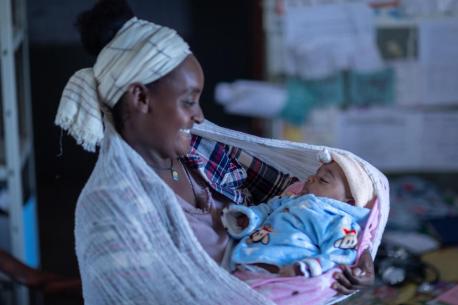
Undernourished and Overlooked: New Report Reveals Global Nutrition Crisis for Women and Girls
Poverty, conflict and climate change are deepening the nutrition crisis among adolescent girls and women, with far-reaching consequences for their own health and futures — and their children's. UNICEF calls for urgent action to help break the cycle.
"Women’s right to nutrition has been overlooked and undervalued for far too long"
More than 1 billion adolescent girls and women in the world suffer from undernutrition, nutrient deficiencies or anemia, while acute malnutrition rates among pregnant and breastfeeding women are climbing fast, according to a new UNICEF report that argues for greater attention and action to address the issue.
Undernourished and Overlooked: A Global Nutrition Crisis in Adolescent Girls and Women, UNICEF's first comprehensive report on the topic, shares new data and evidence of how poor nutrition is widening gender inequalities in terms of future earnings and life opportunities, increasing risks of health complications during pregnancy and childbirth and endangering the health, growth and future development of children.
"Women’s right to nutrition has been overlooked and undervalued for far too long," UNICEF Executive Director Catherine Russell notes in Undernourished. "It is high time we put the nutrition of women and girls at the center of the global development agenda, backed by political commitment and resources."
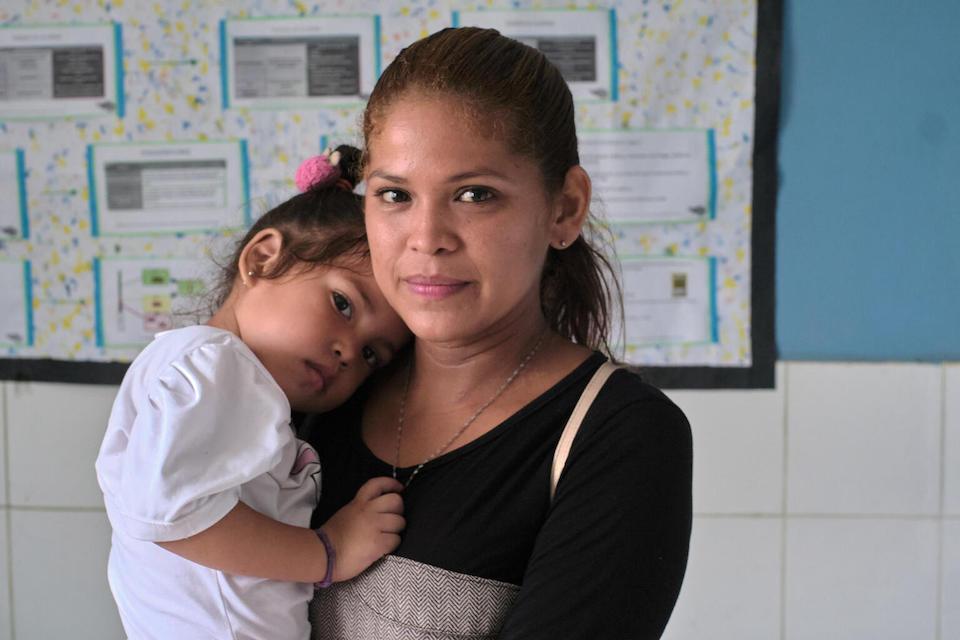
Malnutrition: fueled by a global food crisis, passed down from mother to child
The trend is part of a larger cycle of malnutrition and poverty perpetuated by a global food crisis. Economic fallout from the COVID-19 pandemic and impacts of the war in Ukraine, which sent food and fuel prices soaring, are all contributing factors, making access to affordable nutritious food particularly difficult for adolescent girls and women — especially those living in countries already grappling with conflict, instability and extreme weather events.
According to UNICEF's report, rates of acute malnutrition among pregnant and breastfeeding women have jumped 25 percent from 2020 to 2022 in these 12 hardest-hit countries: Afghanistan, Ethiopia, Burkina Faso, Chad, Kenya, Somalia, Sudan, South Sudan, Mali, Nigeria, Niger and Yemen.
Why girls' and women's nutrition matters
Undernutrition and malnutrition are particularly dangerous for women and girls for a number of reasons:
- undernutrition weakens adolescent girls’ and women’s immunity to infections and increases their risk of life-threatening complications, particularly during pregnancy and childbirth
- poor nutrition hampers girls' and women's ability to learn, earn and thrive — thus perpetuating the cycle of undernutrition, deprivation and poverty
- lack of vitamins and other essential nutrients before and during pregnancy increases the risk of stillbirth or premature birth and can lead to life-threatening conditions like high blood pressure and severe anemia
- women who are too short or too thin are more likely to experience obstructed or prolonged labor that can lead to severe obstetric complications and even death
A child born to an undernourished or malnourished mother is more likely to be malnourished — with potentially lifelong consequences on their survival, growth and future development, the report notes.
The high prevalence of maternal undernutrition and anemia is a key driving factor for the estimated 20 million infants who are born with low birthweight every year. UNICEF also estimates that half of the 51 million children under age 2 who suffer from stunting became stunted during pregnancy and the first six months of life — the critical period during which children are fully dependent on their mother for their nutrition.
The need to expand effective nutrition interventions
Nearly 70 percent — roughly 1.2 billion — girls and women globally suffer from deficiencies of vitamins and other essential nutrients such as iron, zinc, folate and iodine.
An effective intervention to address this is the provision of multiple micronutrient supplements. These multi-vitamin pills are dispensed by health and nutrition workers, along with reminders that taking the tablets consistently is important to get the full benefit.
UNICEF is committed to making these supplements more readily available — while also increasing awareness as to their effectiveness and importance for protecting both mother and baby.
A call to action to leverage and transform food, health and social protection systems for women
In Undernourished, UNICEF notes that the nutrition crisis for adolescent girls and women has been overlooked for far too long, undermining efforts to end child malnutrition as well as achieve gender equality. Undernutrition, micronutrient deficiencies and anemia are all preventable, even in the most challenging circumstances.
The report identifies a number of steps that governments, their development and humanitarian partners, national and international civil society organizations and public and private sector policy makers can take to address the global nutrition crisis for girls and women.
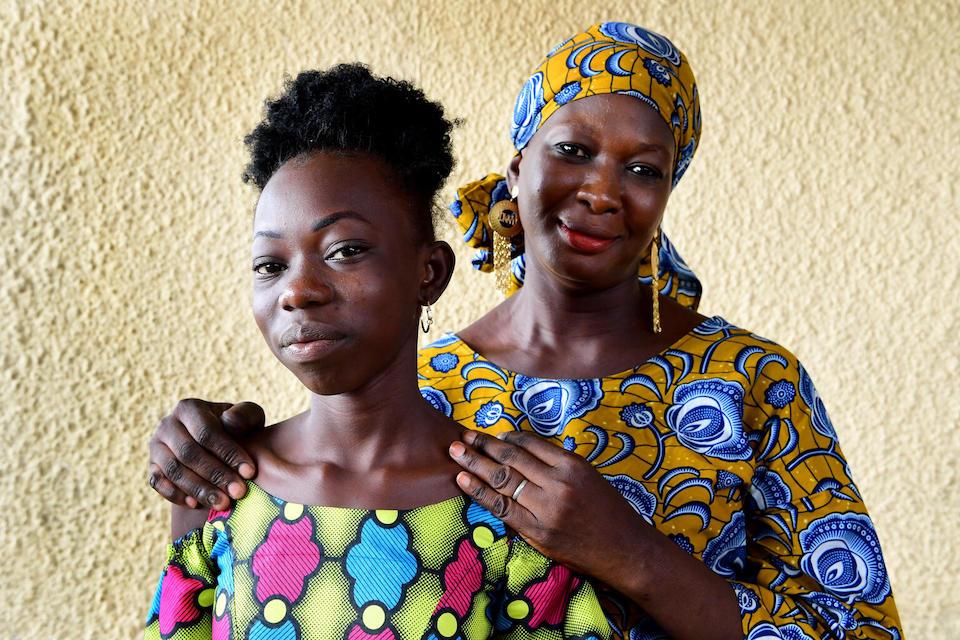
UNICEF's recommendations include:
- ensuring all adolescent girls and women in low- and middle-income countries have access to essential nutrition services before and during pregnancy and while breastfeeding, including access to antenatal multiple-micronutrient supplements – which is the standard of care for women in high-income countries
- expanding the coverage of social protection programs (including cash transfers and vouchers) for the most vulnerable adolescent girls and women to make a diverse diet — one that includes fruits, vegetables, eggs and dairy — more affordable
- adopting gender-transformative policies and legal measures that accelerate the elimination of child marriage and other discriminatory gender and social norms that perpetuate the inequitable sharing of food, household income and domestic work
Russell's call to action: "Let us join together to chart a route out of this crisis, protect the next generation of children from malnutrition and build a more equitable future for girls and women everywhere."
Last October, UNICEF appealed for $215 million in donor support for its No Time to Waste Acceleration Plan, which aims to reach 9.3 million pregnant mothers in 15 countries with a core package of services — including nutrition counseling and support and micronutrient supplements to prevent anemia and low birth weight in newborns.
That appeal remains significantly underfunded.
Learn more about UNICEF's strategies for addressing the global nutrition crisis for girls and women.
Nutrition programs are central to UNICEF's mission. Support UNICEF. Donate today.
